Greek Lasagna
Looking for an authentic Greek Pastitsio recipe? This Greek lasagna is layered with rich meat sauce and creamy yogurt bechamel. Make it ahead or freeze for later.
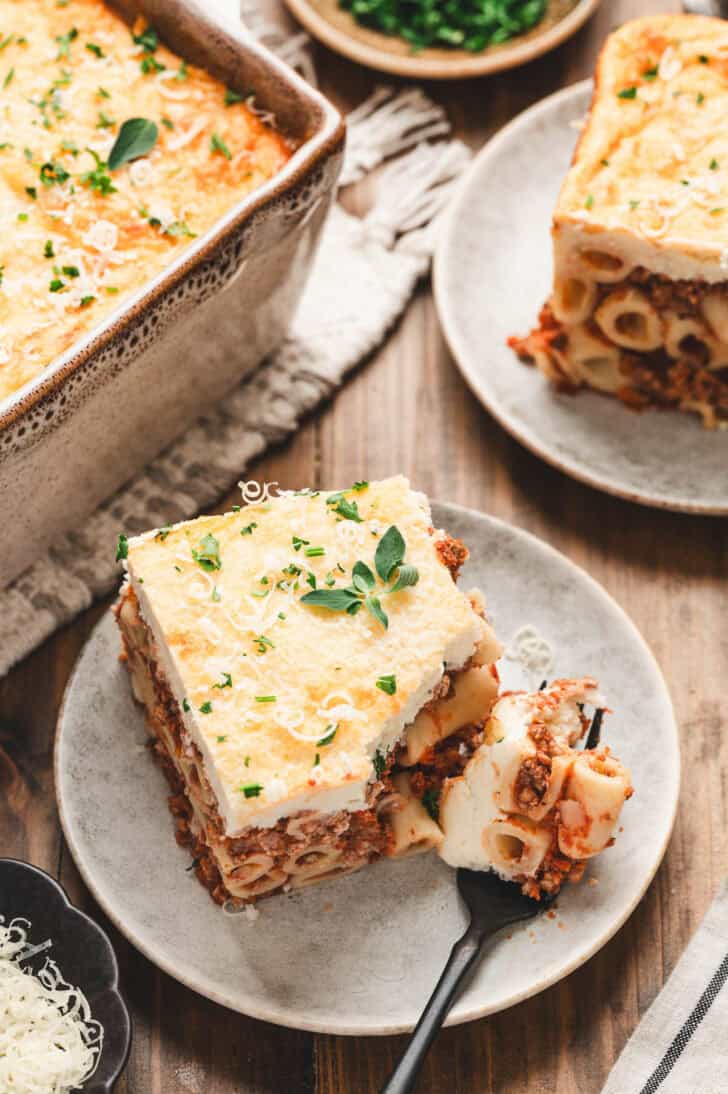
Save This Recipe!
“Made this for my boyfriend and I on date night. It turned out EXACTLY like the picture and I’m so excited I get to eat the leftovers for the next few days. This is definitely going into my special occasion recipe rotation. Thank you for the great recipe!”
—Lara
Greek Lasagna Is Worth The Effort
Greek lasagna – also known as pastitsio (and also spelled pasticio, pastisio, and pastichio) – is something you just have to try to discover how amazing it is. Tender noodles are tossed with a warmly spiced meat sauce, then topped with a thick, creamy layer of bechamel. It’s somewhere between lasagna and baked ziti, but with distinctly Greek flavors like cinnamon and oregano (trust us, it works).
The first time we had Greek pastitsio was in Athens after an extremely long travel day. We stood at an order-at-the-counter restaurant completely overwhelmed, until the owner smiled and asked, “A little of everything?” We enthusiastically said yes. Dish after dish of Greek comfort food arrived at our table, but the pastitsio was the one we couldn’t stop thinking about – and as soon as we got home, we started making it ourselves.
This Greek pastitsio recipe is adapted from Ina Garten’s version, which we’ve used for years. We’ve simplified it slightly to skip a few unnecessary steps, while keeping all the flavor and comfort intact.
Why You’ll Love This Pastitsio Recipe
- There’s not a lot of chopping and no difficult techniques. You just chop one onion and a few cloves of garlic, and that’s it. Beyond that, it’s simply measuring ingredients and adding them when the recipe tells you to.
- It’s make-ahead friendly. You can assemble this pastitsio recipe in advance and bake it later, making it perfect for entertaining.
- The leftovers are incredible. Like many baked pasta dishes, it seems to taste even better the next day.
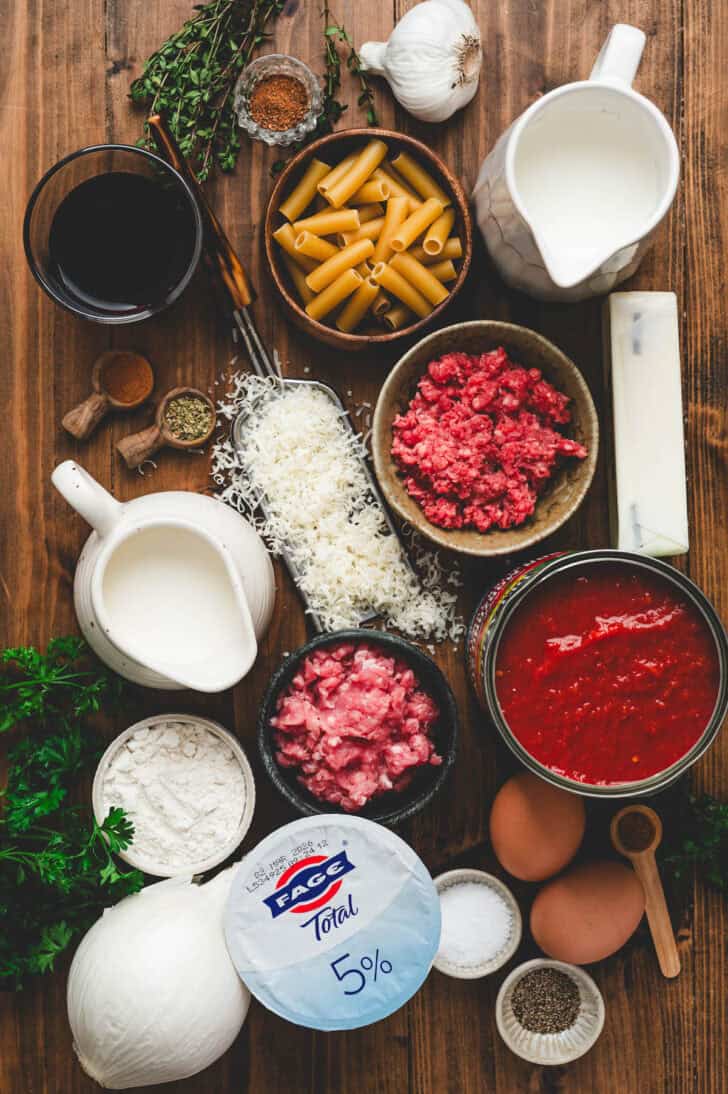
Greek Pastitsio Ingredients
A full recipe card, including exact ingredient amounts, appears at the bottom of this post.
- ground beef and/or lamb – we like to use a combination of these two meats to give the dish a rich and meaty flavor, but you could use all one or the other, depending on your preference.
- onion – this is used to add flavor and texture to the meat sauce.
- olive oil – for sauteeing the onion and meat.
- red wine – deglazing the pan with wine adds depth of flavor and richness to the sauce.
- garlic – because we wouldn’t dream of making a lasagna without garlic!
- cinnamon – if you’re not used to cinnamon in savory dishes, it might seem strange, but don’t skip this. It adds a subtle sweetness and complexity to the meat sauce. The final dish won’t taste like dessert, we promise.
- salt and pepper – seasoning is always key.
- thyme – we like to use fresh thyme for this Greek lasagna recipe when we have it, but you can substitute with half of the amount of dried thyme.
- oregano – this is a spice we typically use the dried version of, to add an earthy element to the sauce.
- cayenne – adds a bit of heat to the sauce and balances the cinnamon.
- canned crushed tomatoes – these are the binder for the meat sauce, and they also add acidity and sweetness to the dish.
- butter – this is the start of the creamy bechamel sauce!
- flour – will be combined with the butter to create a roux that will thicken the bechamel.
- milk and cream – whole milk and heavy cream are the best combo for a rich, velvety sauce. If you use lower-fat substitutes, your sauce will not turn out the same.
- Parmesan cheese – this goes into the bechamel sauce, and more is sprinkled on top of the finished dish, too! Some recipes will call for a Greek cheese, like kasseri cheese or kefalotyri cheese, and these are great if you can find them, but Parmesan works just as well.
- nutmeg – just a pinch of nutmeg is used to add a warm, nutty flavor to the bechamel sauce.
- eggs – beaten eggs help thicken the bechamel and allow it to set up nice and firm as the pastitsio bakes.
- Greek yogurt – plain Greek yogurt adds tanginess and creaminess to the bechamel. As always, we recommend Fage Total 5%.
- pasta – while specific pastitsio noodles do exist, you’ll have a hard time locating them unless you live near a Greek grocery store. So instead, we use ziti or rigatoni, with ziti being our #1 choice. This tube-shaped pasta is easy to work with and eat, and the tubes collect some of the meat sauce inside.
- fresh parsley or oregano – this is an optional garnish but adds a pop of color to the plated dish.
How To Make Greek Lasagna
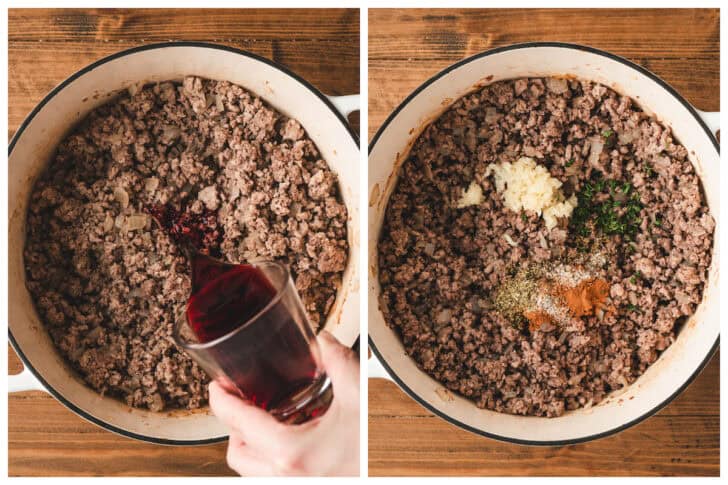
- COOK MEAT. In a large Dutch oven or high-sided skillet on the stove, cook the onion in a bit of oil until lightly browned, then add the beef and lamb and cook until the meat is cooked through, breaking it up as it cooks. Add the wine, then add the garlic, cinnamon, salt, thyme, oregano, black pepper and cayenne.
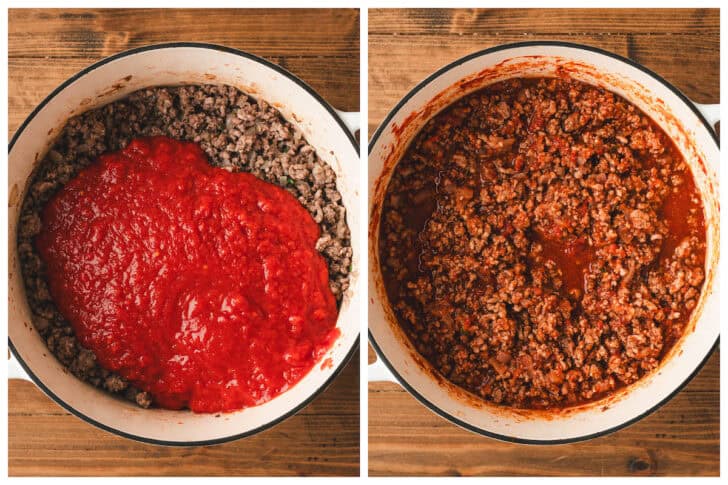
- TOMATOES. Stir in the tomatoes, then simmer the meat mixture for 45 minutes.
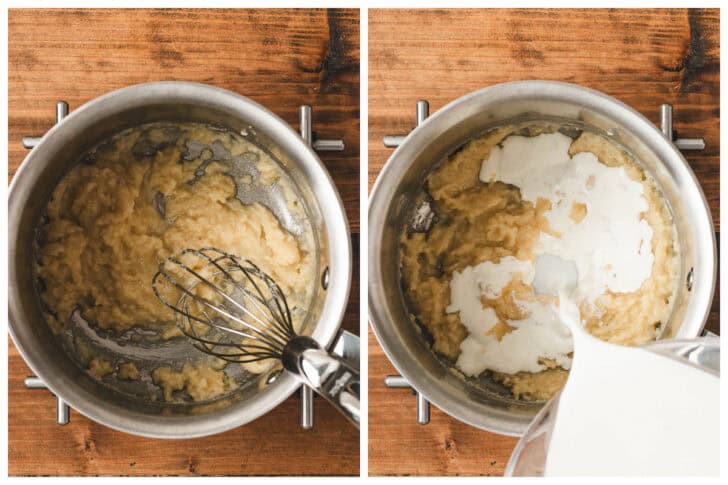
- BECHAMEL. In a saucepan, melt the butter, then add the flour and cook for a minute, whisking constantly. Gradually add the milk and cream, then cook until slightly thickened.
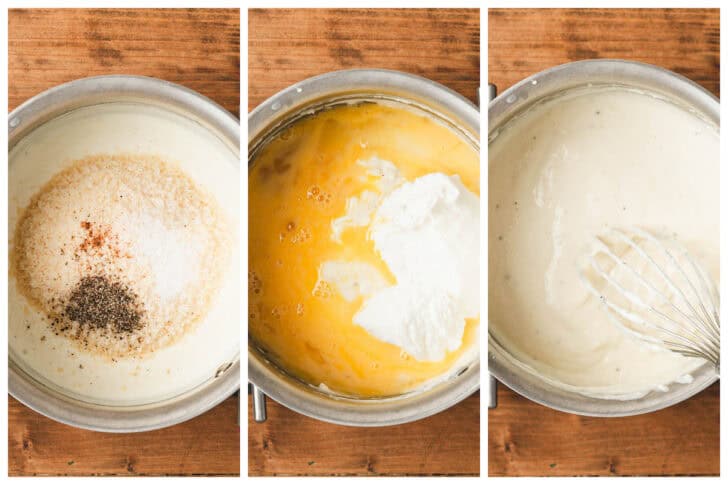
- FINISH CREAM SAUCE. Remove the béchamel sauce from the heat and whisk in the cheese, salt, pepper and nutmeg. Allow this to cool for 10 minutes, then whisk in the eggs and yogurt.
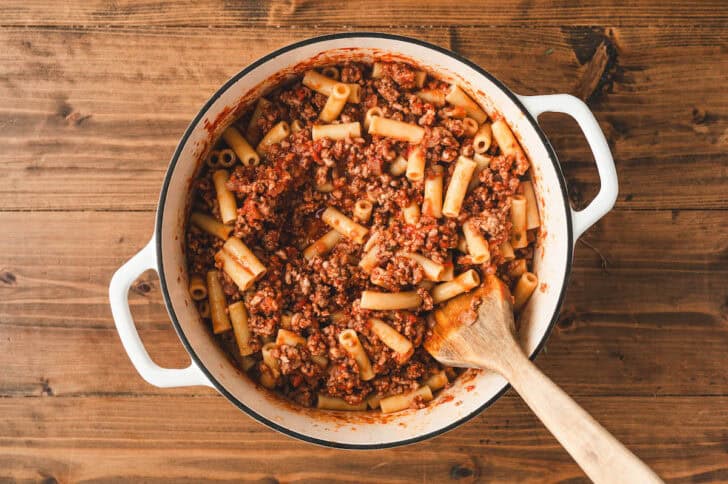
- PASTA. Heat a large pot of salted water to boiling and cook the pasta 1 minute less than the package instructions for al dente. Then, drain the pasta and toss it with the meat sauce.
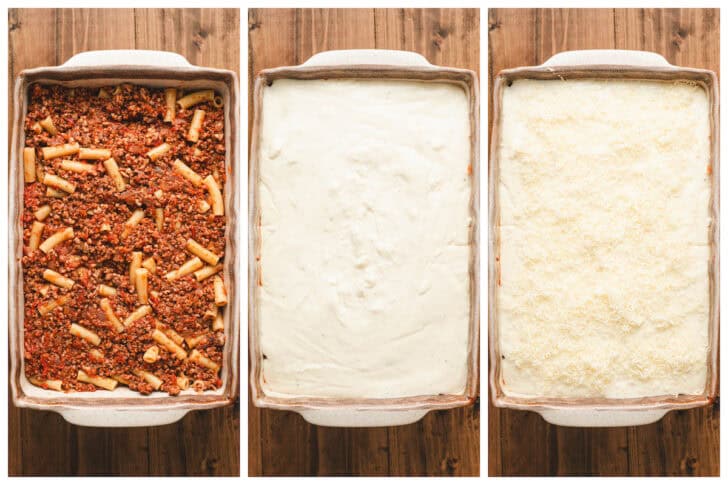
- ASSEMBLE. Spread the pasta mixture into a large casserole dish, then spread the cream sauce over it. Sprinkle with the remaining grated cheese.
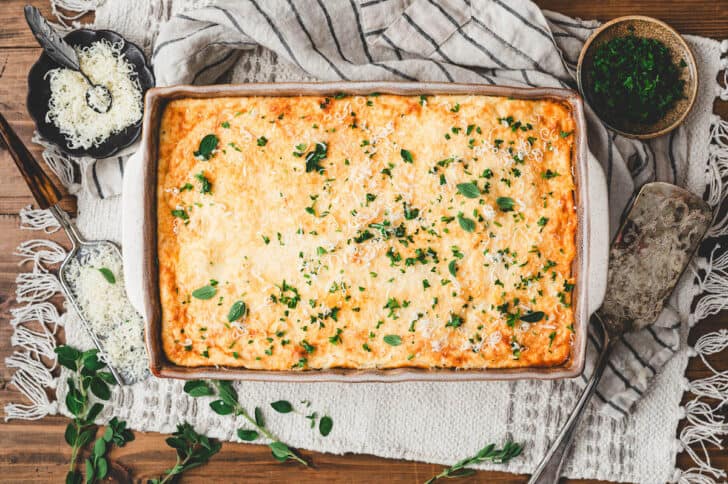
- BAKE. Bake 1 hour or until golden brown and bubbly around the edges. Let stand 10 minutes before serving garnished with fresh parsley and/or oregano.
Pastitsio Recipe Home Chef Tips
- Don’t overcook the pasta. Be sure to boil it 1 minute shy of al dente, according to the package instructions. The pasta will continue to cook in the oven, and you don’t want mushy noodles.
- Don’t skip the cinnamon. Cinnamon in a savory dish may feel unusual, but it’s essential for this authentic Greek food. Try it, even if you’re a bit unsure.
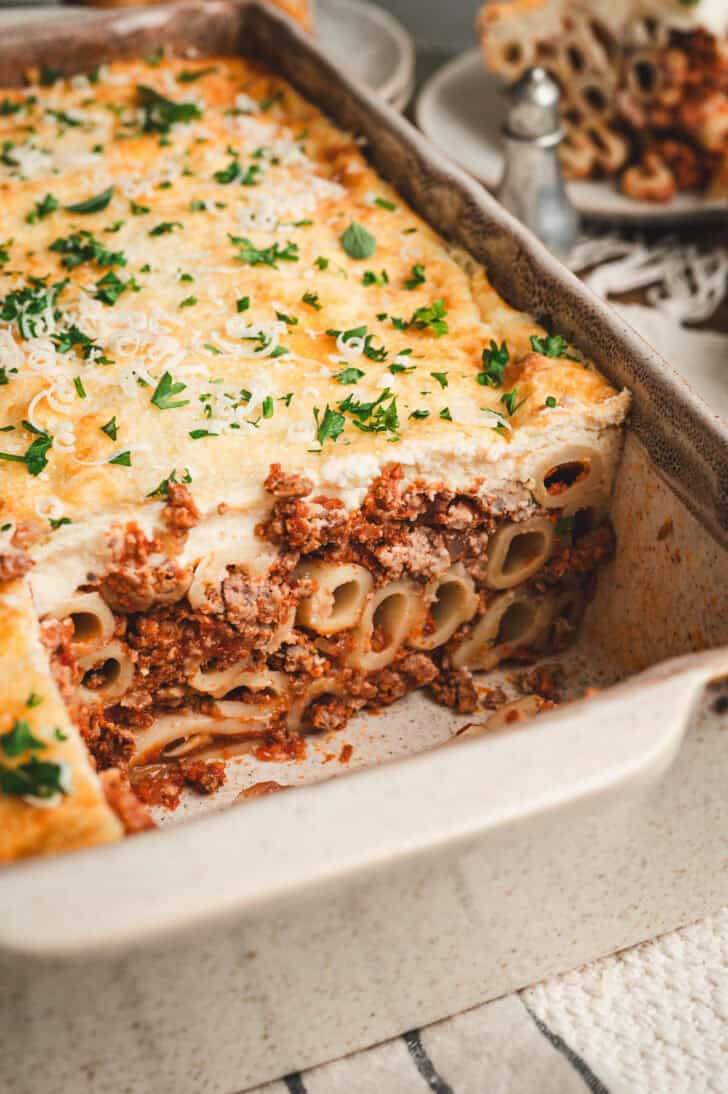
What To Serve With Greek Lasagna
Pastitsio is rich, hearty and deeply savory, so it pairs best with sides that bring freshness and contrast. A crisp green salad with Citrus Salad Dressing or Feta Cheese Salad Dressing always works well.
Roasted or sauteed vegetables are another great option. Roasted Broccoli With Parmesan, roasted carrots and Balsamic Green Beans work especially well.
And of course, no Midwesterner ever turned down some warm Homemade Garlic Bread to soak up every last bit of sauce.
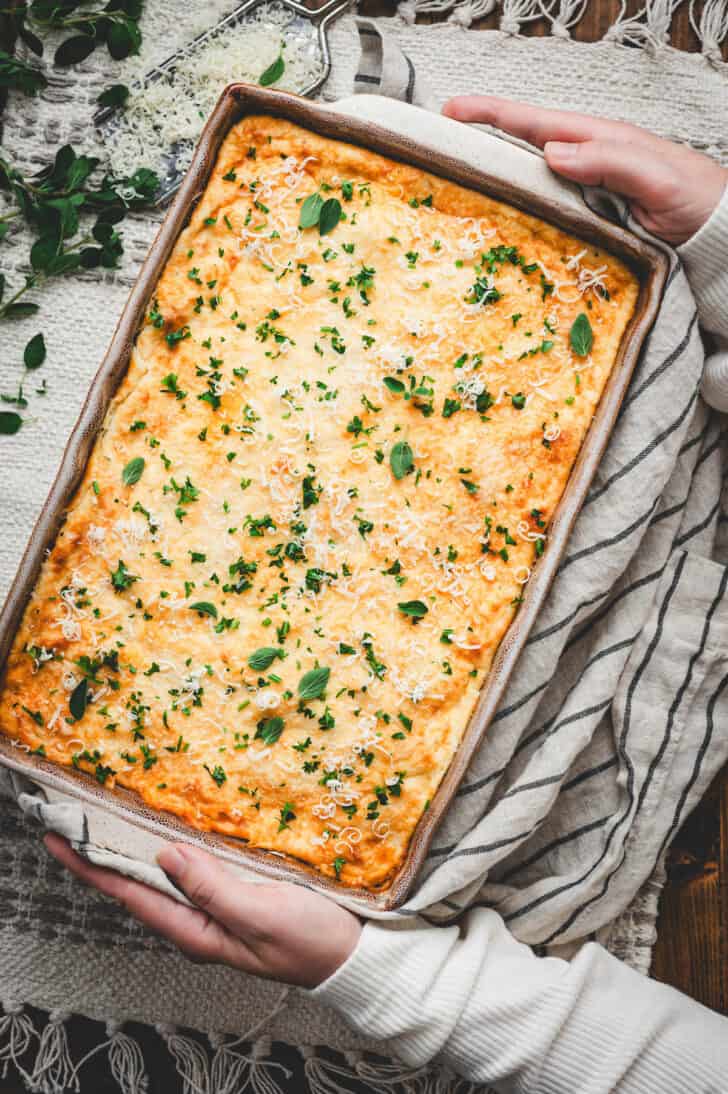
Greek Pastitsio Recipe Make Ahead And Storage
- Make Ahead: This Greek lasagna can be assembled, covered and refrigerated, up to 3 days, or frozen up to 3 months, before baking. If frozen, thaw overnight, or even 2 days in advance if you can. Either way, bring to room temperature on the counter 1 hour before baking. If we’re planning for make-ahead meals, sometimes we’ll divide the recipe among 2 or 3 smaller disposable foil pans instead of one large dish.
- Refrigerate: If you have leftovers, transfer them to an airtight container and place them in the fridge uncovered for a few hours until they are fully chilled, then cover them with the lid and keep in the refrigerator up to 3 days.
- Reheat: In the oven or microwave until warmed through. If reheating in the oven, place leftovers in a small baking dish and add a splash of water in the bottom, so that the bottom noodle layer stays soft, and cover the baking dish with foil.
- Freeze: The easiest way to freeze leftovers in individual pieces is to bake the whole pastitsio and refrigerate the leftovers in their pan overnight. It’s much easier to portion and wrap individual pieces when the pastitsio is chilled than when it is warm. The next day, cut the chilled pastitsio into pieces and wrap them individually in plastic wrap, then foil. Place the pieces in freezer bags and freeze for up to 3 months. Thaw in the fridge overnight before reheating.

More Foxes Love Lemons Favorites
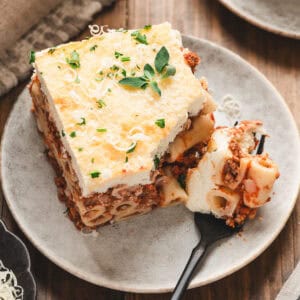
Pastitsio Recipe
Save This Recipe!
Ingredients
For the Meat Sauce:
- 2 tablespoons olive oil
- 1 medium white onion chopped
- 1 pound ground beef
- 1 pound ground lamb
- ½ cup dry red wine
- 4 garlic cloves minced
- 1 tablespoon ground cinnamon
- 2 teaspoons kosher salt
- 1 ½ teaspoons fresh thyme leaves
- 1 ½ teaspoons ground oregano
- 1 teaspoon ground black pepper
- ¼ teaspoon cayenne pepper
- 1 can low sodium crushed tomatoes in puree 28 ounces
For the Cream Sauce:
- 4 tablespoons unsalted butter
- ¼ cup all-purpose flour
- 1 ½ cups whole milk
- 1 cup heavy cream
- ¾ cup shredded Parmesan cheese
- 1 teaspoon kosher salt
- 1 teaspoon ground black pepper
- ¼ teaspoon ground nutmeg
- 2 eggs beaten
- ⅔ cup plain Greek yogurt
For Assembly and Serving:
- 12 ounces ziti pasta
- ¾ cup shredded Parmesan cheese
- 2 tablespoons chopped fresh parsley for garnish (optional)
Instructions
- Make the Meat Sauce: In large Dutch oven, heat oil over medium heat. Add onion and cook 4 to 6 minutes or until lightly browned, stirring occasionally. Add beef and lamb; cook 8 to 10 minutes or until meat is cooked through, breaking up meat with back of wooden spoon as it cooks.
- Add wine; cook 2 minutes, stirring occasionally. Add garlic, cinnamon, salt, thyme, oregano, black pepper and cayenne. Cook 5 minutes, stirring occasionally.
- Stir in tomatoes. Heat mixture to boiling over medium-high heat, then reduce to medium-low and simmer 45 minutes, stirring occasionally.
- Make the Cream Sauce: In medium saucepan, melt butter over medium heat. Add flour and cook 1 minute, whisking constantly. Gradually pour in milk and cream while whisking constantly. Cook 5 to 7 minutes or until slightly thickened, stirring frequently.
- Remove from heat and whisk in cheese, salt, pepper, and nutmeg. Allow sauce to cool for 10 minutes, then whisk in eggs and yogurt.
- To assemble, preheat oven to 350 degrees F. Heat large pot of salted water to boiling over high heat and cook pasta 1 minute less than package instructions for al dente.
- Drain pasta and add to meat sauce; toss until well combined. Spread pasta evenly into large baking dish (see Notes). Spread cream sauce over pasta evenly. Sprinkle with cheese.
- Transfer to oven and bake 1 hour or until golden brown and bubbly around the edges. Let stand 10 minutes before serving garnished with parsley.


I can make complete recipe and freeze?
There are detailed freezing instructions in the post above! 🙂
I’m making Pastitiso for some company but I need to make as much of it as possible before they arrive in a few days. Any suggestions?
Hi Patricia – no real advice other than to try to make a double or triple batch. If you need help with any of the calculations to multiply the recipe, just let me know!
Whoops, I think I misunderstood. You want to make in advance and then heat it up when company arrives? Go for it! You can fully assemble everything up to 3 days in advance. Cover and refrigerate it unbaked. When you want to bake it, bring it to room temperature 1 hour before baking. Enjoy!
Thank you so much. That is exactly what I will as soon as I receive the arrival date. Because the dish is a little time-consuming, this will allow me more time for the guest. Also, thank you for your quick response.
Re-reading this recipe I just had another idea of how to make it low carb: use chunks of roasted eggplant in place of the pasta. The almond pasta recipe I thought about it too high carb for me. I’m hoping that almond flour would work in making the sauce.
I love the eggplant idea, Susan! I’m not sure if the almond flour will thicken the sauce or not, but hopefully it will enough to make it work!
Love this recipe! A family fav! I use Citarella pasta. Perfect Sunday night family dinner ❤️
I am so glad to hear you liked this, Yvonne!
I could definitely enjoy this dish. Greek food is one of my favorites, and the addition of cinnamon always makes it good. This would give me an opportunity to try an almond pasta recipe I have (that way I could REALLY enjoy this, because it become very low carb). I am assuming that one could use fresh, uncooked pasta here. Having extra left over to freeze is also a plus. Even though most of what I cook these days is really simple, I don’t mind spending more time in the kitchen as long as the dish isn’t too complicated. Now my husband’s take on cleanup might be a bit different…
Yep, most of what we cook is simple for most of the week, but sometimes I enjoy a weekend project. I think fresh, uncooked pasta would be just fine here. As long as it’s nice and al dente when it goes in to bake.